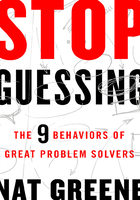
HOW BECOMING A GREAT PROBLEM-SOLVER CAN CHANGE YOUR LIFE
Many people accept the world the way it is, and don’t see the incredible potential that is locked behind hard problems. But throughout history, solving the hardest problems facing humanity has been at the root of much of our economic, medical, and social progress. Imagine for a moment a world in which a few million great problem-solvers are on hand to deploy to these problems. A world of great problem-solving will yield incredible economic and social impact for each of us.
You may be able to imagine how solving problems in your operations, human resources department, sales and marketing, and research and development can help your business’s bottom line. But when businesses solve hard problems that are holding them back, they often become far more resource efficient: They are able to waste less materials and energy, fuel, and carbon, and that helps everyone. A colleague of mine helped a large industrial plant save millions of dollars in energy costs by helping them convert from burning natural gas to using bark from the trees—in a few weeks and without added capital cost. In the same stroke, she eliminated so much fossil-fuel burning that it offset the lifetime carbon output of my entire team and all their families.
Imagine being able to thoroughly understand and change undesirable behaviors in your life or those of your friends coming to you for help. If you’re able to understand what drives your overeating, procrastination, or anger, you can alter key levers in your thinking and environment to achieve victory. Without this understanding, you’re depending on hope—and hope is not a strategy.
Developing your problem-solving skills can also lead to tremendous improvements in your relationships. I’m at the age now where some of my friends are having serious marital problems, or even getting divorced. Some will discuss this with me, and what I consistently learn is that their marriages are falling apart because of problems that cropped up 10 years earlier, and simply weren’t confronted. Instead, they festered and built resentment, and by the time the couples started really talking, they had drifted apart. They didn’t have the skills to solve these problems before they became too big, so the couples had often lost the will to tackle them and they seemed impossibly difficult. Some people are just not meant to be together and other change over time, but the application of great problem-solving behaviors would certainly help, whatever they decide for their futures.
When you’re a great problem-solver, you can help your organization or family make better decisions and reduce conflict. Many heated disagreements seem to stem from people having different opinions over the best course of action, and trying to use social capital to compel others to trust them over someone else. Instead, imagine if you understood completely how each decision would affect the bottom line you all want, and were able to tell the story clearly and decisively. I’ve found that great problem-solving makes developing alignment as easy as it can be.
These skills can even help you overcome bias in others. The main bias I suffered from in my early twenties was that I was seen as being too young to help a business. People believed I lacked the maturity and experience to add value. Because I had developed great problem-solving skills, I was able to help business leaders clearly see the reasoning behind a great decision, instead of rely on the “authority” of experience that I did not have. Instead of being seen as an immature young person, I was seen as a helpful problem-solver, and respected for it.